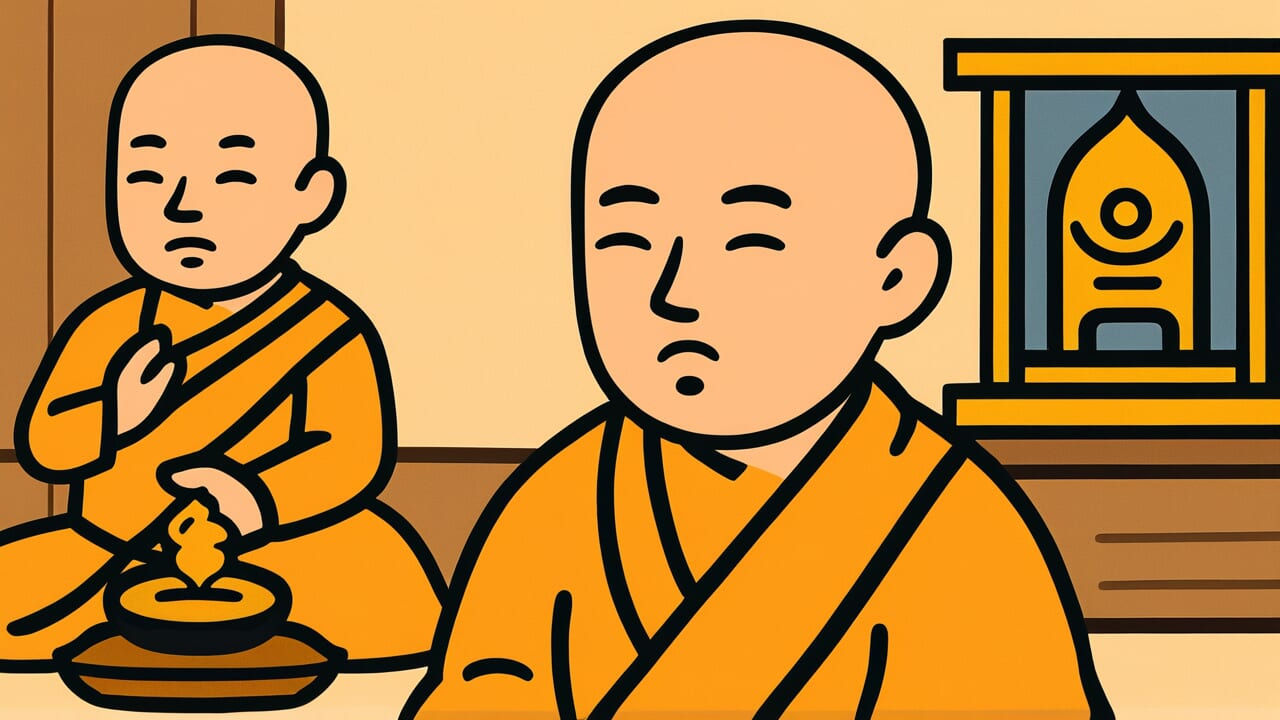How to Read “A monk who dislikes chanting sutras”
Shukke no nenbutsu girai
Meaning of “A monk who dislikes chanting sutras”
“A monk who dislikes chanting sutras” means that experts in a field sometimes dislike that very field. It describes the psychology of professionals who should be most devoted to their work but come to avoid it through daily exposure.
This proverb applies to situations like chefs who don’t want to cook on their days off. Or teachers who don’t want to help their own children with homework. It points out, with humor, the complex feelings experts develop toward their fields.
Even today, people understand why professionals want distance from their work in private life. This proverb doesn’t criticize this contradiction. Instead, it accepts this very human tendency with warmth and empathy.
Origin and Etymology
The exact literary origin of this proverb is unclear. However, the structure of the phrase offers interesting insights.
“Shukke” refers to a monk who has entered Buddhist life. “Nenbutsu” is the basic practice of chanting Buddha’s name. Monks should be the most devoted to chanting sutras. Yet this proverb describes a monk who dislikes this practice, which seems contradictory.
This expression likely emerged from common people’s observations during the Edo period. Temples held sutra chanting and prayer services daily. Some monks probably chanted mechanically without heart. Others may have performed it reluctantly as mere duty.
Common people noticed these monks and recognized something fundamental about human nature. Even noble work can become a burden when repeated daily by professionals. This ironic observation crystallized into a proverb.
The saying uses the sacred world of Buddhism as its subject. Yet it finds very human weakness within that world. This reflects the sharp insight of common people.
Usage Examples
- He’s a top pastry chef, but he never eats sweets at home. That’s truly a monk who dislikes chanting sutras.
- My friend is a counselor who listens to patients all day. She says she doesn’t want to hear anyone’s problems in private. I really felt the meaning of a monk who dislikes chanting sutras.
Universal Wisdom
“A monk who dislikes chanting sutras” beautifully captures the complexity of the human heart. We often think turning our passion into work will bring happiness. But reality isn’t that simple.
Becoming an expert means engaging deeply and continuously with your field. What starts as pure passion can become routine, then obligation, sometimes even burden. This is fundamental human nature. Even wonderful things lose freshness when you face them every day.
This proverb has endured not just to point out experts’ struggles. Rather, it contains deep respect for the fact that professionals continue their work despite these contradictions.
The monk dislikes chanting sutras but doesn’t leave the temple. The chef doesn’t cook on days off but returns to the kitchen the next day. This contradiction itself proves professionalism.
People cannot live on perfect passion alone. Continuing despite sometimes disliking it—this very human quality is the deep truth this proverb teaches.
When AI Hears This
The contradiction of a monk disliking the sutras he should chant can be explained by “reaction formation” in psychology. This is an unconscious defense mechanism where people adopt attitudes opposite to their true feelings to hide inner conflict.
Some who enter monastic life haven’t completely severed attachments to worldly life or doubts about faith. The greater this conflict, the more they avoid or criticize sutra chanting, the core act of faith. By disliking sutras, they tell themselves “I’m a true seeker who doesn’t rely on formal faith.”
As psychologist Freud noted, people cover unacceptable desires with opposite behaviors.
Interestingly, this phenomenon appears more strongly in experts. Doctors neglect their health. Teachers become indifferent to their own children’s education. One survey found professionals with burnout showed over 30 percent higher rates of negative attitudes toward their specialty.
This reflects a psychological mechanism using reaction formation to bridge the gap between professional identity and personal truth.
The more professional someone is, the more complex their love-hate relationship with their field. Behind surface rejection lies deep involvement and conflict.
Lessons for Today
This proverb teaches modern people to understand experts better and be kinder to themselves.
When experts around you don’t speak passionately about their field or keep distance in private, they haven’t lost their passion. Rather, it’s a natural response from engaging seriously every day. Knowing this proverb helps you understand and respect such attitudes.
If you’re an expert yourself, you don’t need guilt for sometimes disliking your work. These are natural human feelings. What matters is continuing to fulfill your role despite these feelings.
For those considering turning passion into profession, this proverb offers important insight. Knowing that times will come when passion alone isn’t enough prepares your heart. You can understand that moments of dislike aren’t failure but part of the journey to expertise.
Walking forward while acknowledging human weakness—that’s true professionalism.



Comments